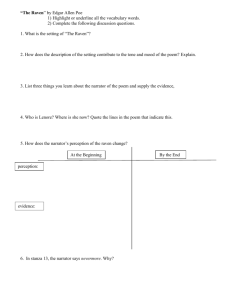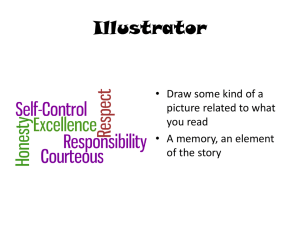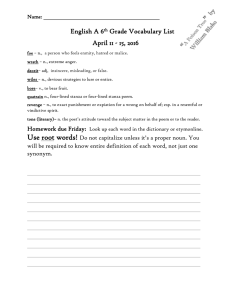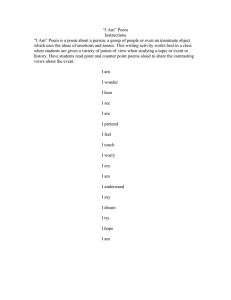War is Kind Analysis
advertisement
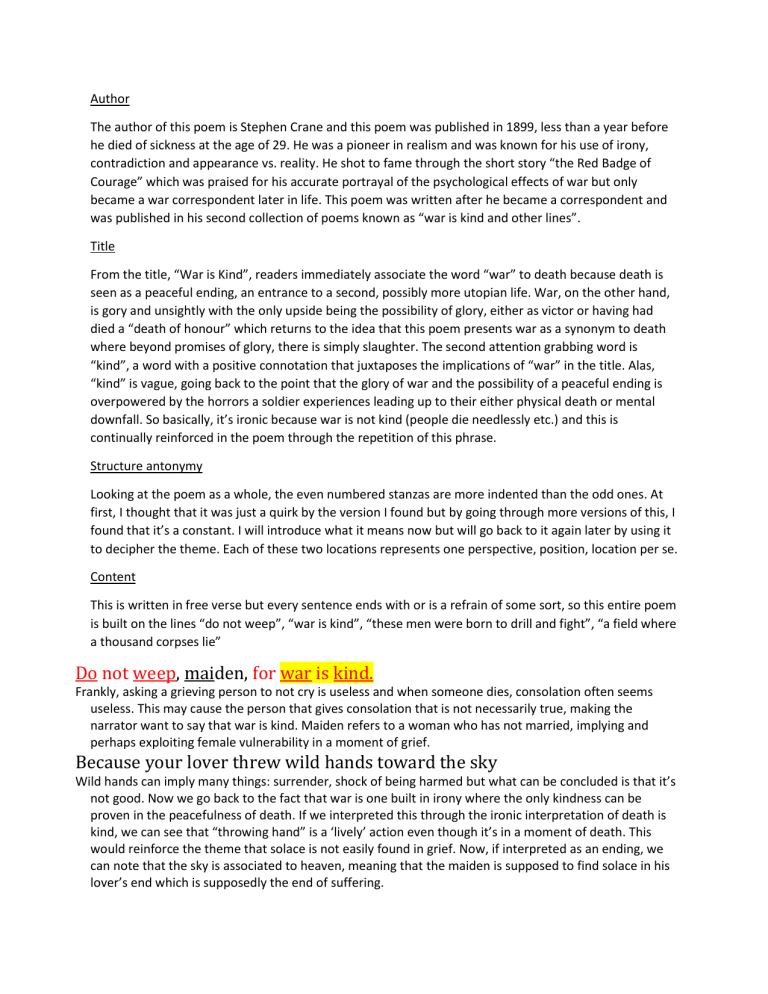
Author The author of this poem is Stephen Crane and this poem was published in 1899, less than a year before he died of sickness at the age of 29. He was a pioneer in realism and was known for his use of irony, contradiction and appearance vs. reality. He shot to fame through the short story “the Red Badge of Courage” which was praised for his accurate portrayal of the psychological effects of war but only became a war correspondent later in life. This poem was written after he became a correspondent and was published in his second collection of poems known as “war is kind and other lines”. Title From the title, “War is Kind”, readers immediately associate the word “war” to death because death is seen as a peaceful ending, an entrance to a second, possibly more utopian life. War, on the other hand, is gory and unsightly with the only upside being the possibility of glory, either as victor or having had died a “death of honour” which returns to the idea that this poem presents war as a synonym to death where beyond promises of glory, there is simply slaughter. The second attention grabbing word is “kind”, a word with a positive connotation that juxtaposes the implications of “war” in the title. Alas, “kind” is vague, going back to the point that the glory of war and the possibility of a peaceful ending is overpowered by the horrors a soldier experiences leading up to their either physical death or mental downfall. So basically, it’s ironic because war is not kind (people die needlessly etc.) and this is continually reinforced in the poem through the repetition of this phrase. Structure antonymy Looking at the poem as a whole, the even numbered stanzas are more indented than the odd ones. At first, I thought that it was just a quirk by the version I found but by going through more versions of this, I found that it’s a constant. I will introduce what it means now but will go back to it again later by using it to decipher the theme. Each of these two locations represents one perspective, position, location per se. Content This is written in free verse but every sentence ends with or is a refrain of some sort, so this entire poem is built on the lines “do not weep”, “war is kind”, “these men were born to drill and fight”, “a field where a thousand corpses lie” Do not weep, maiden, for war is kind. Frankly, asking a grieving person to not cry is useless and when someone dies, consolation often seems useless. This may cause the person that gives consolation that is not necessarily true, making the narrator want to say that war is kind. Maiden refers to a woman who has not married, implying and perhaps exploiting female vulnerability in a moment of grief. Because your lover threw wild hands toward the sky Wild hands can imply many things: surrender, shock of being harmed but what can be concluded is that it’s not good. Now we go back to the fact that war is one built in irony where the only kindness can be proven in the peacefulness of death. If we interpreted this through the ironic interpretation of death is kind, we can see that “throwing hand” is a ‘lively’ action even though it’s in a moment of death. This would reinforce the theme that solace is not easily found in grief. Now, if interpreted as an ending, we can note that the sky is associated to heaven, meaning that the maiden is supposed to find solace in his lover’s end which is supposedly the end of suffering. Another thing to be noted is that it says that the love “threw” the hands, as if intentional. This can reference that despite what is mentioned about glory at the beginning of the second stanza, the soldier himself knew death was definite. And the affrighted steed ran on alone, Horses are associated for freedom so what can be observed is that when death or defeats arrive, there is a loss of freedom because as much as heaven can be seen as utopian, there is a loss of earthly freedom. Now, the colour of the horse is not specified but a white horse is specifically associated with death, implying that he died. Note how nothing has directly mentioned that the man has died. Do not weep. War is kind. This is a refrain (group of lines at the end of a stanza). The importance of a refrain is that by repeating these 2 phrases, it provides emphasis on the central and conflicting themes which lead to a central point: war is not kind, it’s ironic. The emphasis in these 2 is on “Do” and “weep” as well as “war” is “kind”. The words that are emphasized are not the ones who affirm or deny whether they should weep and whether war is kind. Despite this, “do not weep” is found in the same sentence as the previous two lines which suggests that he wants to believe that death is kind but through this, it is clear to widow and readers that his reasoning is futile. Hoarse, booming drums of the regiment, “Booming” is an onomatopoeia and is also a really emphasize syllable. It also implies two things: an explosion which establishes the location of a war zone and an an echoing effect and what we all know echoes are is that in big, empty place, what we say is repeated. In a battle field, we can assume that many soldiers have echoes of each others’ aspirations, but this drum is also hoarse, or empty, implying that the possibility of death is still prevalent even in the drums which was what was supposed to keep soldiers, motivated, organised, still acknowledges death. Little souls who thirst for fight, In a battle, there are many people, so no matter how great each person is, in the grand scheme of things, their presence is miniscule. Also, “soul”, really, this is the defining factor of us being alive and implies that the living is only important for their ability to fight. “Thirst” is a metonymy because it implies desire. What this word choice seems to say is that fighting is as essential to humans as water is, which is not true, unless in a situation I will talk about in one moment. These men were born to drill and die. “Born” and “die” are right beside each other and they juxtapose of each other but that’s exactly what it is, the beginning and the end: the 2 definite events in one’s life. Now, in between those is drill, interestingly because it’s the sense of practising for war and not fighting itself. We were not made to fight, if we fight, we die. The unexplained glory flies above them, War efforts often came from propaganda and a sense of national pride, but it is questionable. I can read this line in 2 ways. I can read “glory” as a metonymy which symbolises flag, which was used to mark conquest, or I can read “flies” as a personification which indicates that the glory is what they’re motivated by. Whether you want to read either or none literally, there is the idea of the unattainability of this glory. It’s above them. Now, what’s above them? The heavens, right. So that’s a goal, they can’t attain until they die but this returns another question, is that glory? Great is the battle-god, great, and his kingdom— And now, in this line, we’re introduced to a god who I will refer to as Ares because I went through a Greek mythology phase. Also, he is the god of war, not war strategy. That’s Athena. Now, let’s look at the last few lines if a god was supervising this war. A god is an immortal being, to him, a human life is so short. To him, one of our souls would be little and men are just pawns who fight his war. There is also a concept I’d like to introduce, which is, how do you kill a god? You can’t defeat him. How you kill a god is by forgetting him, which is why his kingdom would exactly be where the battle is, where the death is. A lot of deaths mean a strong battle god. And if they’re anything like the ones I’ve read about in Percy Jackson, they expect you to be thankful that they gave you a chance at glory. So now, we can see the narrator as someone who reflects his values. Finally, there’s an em dash, which takes the place of a comma. The use of this, is that when an em dash is used, it has more emphasis on the pause, as if preparing the reader for the next line. Also, there’s a partial rhyme between them and kingdom. A field where a thousand corpses lie. Before, it’s always how small a human soul is, but this person can’t deny that when a field is full of people, the little souls and single purposed men become something more. Add to the fact, that the 6th line in the even stanzas are the only rhyming line (which is the 3rd one), it really emphasizes the difference of a perspective of a human life. The war god would be happy about this though, because without war, he would be a dead god So, in this stanza, we see a comparison between the mortal and the immortal on the topic of life and its purpose and someone who doesn’t quite understand what is “good”. Between the first and the second, we see a change in location and a change in tense. The first is written in past as the war happened but is notably written first, the second is written in present, proving the immortality of war. Do not weep, babe, for war is kind. A baby can’t understand the loss of someone so they don’t understand that their father is dead, but they cry a lot. If we compare this to the attempt of comforting a widow, a baby is even more difficult is comfort using words. Because your father tumbled in the yellow trenches, Again, the soldier dies. Note that the verb in both of the “soldier-dies” verses both use verbs that we would not typically imply death, again an attempt to console the baby. Then, there’s a colour. So, this poem was written before world war I but when I initially read this, I though of mustard gas. A 19th century presence of yellow, notably of journalism (Stephen Crane was a war correspondent) is that there was yellow journalism, their version of fake news. This line would then take on the meaning that his death would’ve been glorified, as it is in this poem right now, by the newspapers. It could also symbolize the presence of illness due to unsanitary conditions as well as the colour of the soil. Raged at his breast, gulped and died, This is misdirected, what he probably did was clutch his chest. It could also refer to a violent burst of emotion, which can be described as rage in the final moments where they can formulate their last thoughts. Gulped refers to how quickly he dies as he is only able to take one breath. Do not weep. War is kind. And now, we’re at the refrain again. In both stanzas, we see that despite the narrator telling the griever not to cry, that there’s really no reason why they shouldn’t. This only enforces the idea that war is not kind. Swift, blazing flag of the regiment, And now we’ve returned to the battle field. In this one, it describes a flag as “blazing”. This sets up the setting of the battle field once again, right now in this yellow field full of death, there are flags in the sky which represent the pride that both sides continue to have. If a flag is blazing, it means that light shine upon it which juxtaposes the yellow field and the dying people. This detail could also reinforce the irony by having to look for something with a positive connotation (the presence of light) in the battlefield. Eagle with crest of red and gold, Eagle represents patriotism as war efforts were based on propaganda. The red symbolizes blood which juxtaposes the gold which symbolizes glory. These men were born to drill and die. Here’s this line again so it’s a refrain even though it’s not at the end of a stanza. One thing that can be noted is that in this sentence which goes over the 3 verses, this is the first that acknowledges human presence. Again, this emphasizes the low position individuals have in the grand scheme of killing because their country asks them to. Point for them the virtue of slaughter, There really is no virtue in slaughter. Enforcing the fact that death is not kind, the narrator asks someone, which is not clear, but we can say is Ares once again, to make a point of killing as if the other side is not also human. This virtue is one that is not natural and only pushes the irony that death is not kind because there was never any virtue behind them. Make plain to them the excellence of killing This line rewords the point in the last line. “Killing” and “slaughter” is the uncensored versions of what is being done but this is being hid behind the flag of pride and glory. In this line, there is the repeat of a’s, then e’s, then I’s to emphasize the repetition of the lines that ask for justification but cannot be justified. And a field where a thousand corpses lie. This line in this context refers that the narrator also asks to find virtue in all these dead bodies, they’re in the same sentence. Mother whose heart hung humble as a button There is a change of structure because the repetition of “do not weep (insert name), war is kind” and establishes the conclusive tone by being shorter than the other ones. “Heart” is a metonymy which refers to the soul and “humble as a button” is a simile which compares the soul to a simple button. This refers that a mother might’ve had wishes for his son to be successful in war (like many of our parents have extravagant wishes for our future) but is humbled by his death. On the bright splendid shroud of your son, The narrator is once again trying to find lightness in a moment of darkness (refer to flag) but a shroud, regardless of its settings is not a place typically described as bright which once again reinforces the irony of death being kind. Do not weep. Seriously, you’re asking the mother who created this now dead son to not cry over his grave? War is kind. This time, it’s conclusive. The structure of this stanza is also different compared to that of the other odd numbered ones as if the narrator having to confront the futility of comforting the mother. The title is also the last line of the poem, asking readers to once again, consider the absurdity of concluding that war is best described as kind, especially if it has taken the life of someone who’s close to you. In conclusion, war is not kind, despite death being a possibility of the advantages of death shown through the mentions of the sky, heaven, gods and all that, before that (look at structure) and foremost, it is cruel by killing people and leaving loved ones alone. Their grief is reflected in their desire to cry and the narrator’s attempts at trying to justify the kindness of war only intensifies their suffering. One cannot easily find solace in grief in a situation like this.

